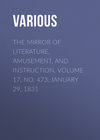Читать книгу: «The Mirror of Literature, Amusement, and Instruction. Volume 17, No. 473, January 29, 1831», страница 5
SACRIFICE OF A MORISCOE GIRL
It would be unreasonable to expect analyses of Novel stories in a periodical sheet like our Miscellany. We rarely attempt the task of giving them; but prefer giving occasionally a running notice of a meritorious work of this class, and then leave the reader to indulge his taste at the nearest library, upon the strength of our recommendation. To let him into the plot or thread of the story would be ill-judged: for one of the greatest delights of reading, of all ages, is to expect, hope, and despair, by turns, and thus become identified with the feelings and actions of all parties concerned in the narrative. Every lover of novel, tale, and romance must recollect the pleasure of reading Mr. Grattan's Highways and Byways, and how beautifully the scenes and incidents were grouped in those little series of tales by the roadside. The charming interest of one of them is worth a whole volume of lumbering history of a revolution or royal line. Mr. Grattan, too, has taken all the Low Countries to himself, and the literature of their life belongs to him. The other day he published a history of the Netherlands (noticed in the last volume of the Mirror, page 257); and here we have him again, with The Heiress of Bruges, a tale of the year 1600.
The main story needs not be told; but a scene may be easily detached, to show what spirit-stirring scenes may be expected throughout the work. It needs only be premised that Beatrice, in our extract, is the co-heroine of the Heiress of Bruges, and is sacrificed by the Inquisition in Brussels:—
A law of the Emperor Charles V., passed half a century before, had decreed the frightful punishment of living burial against female heretics, and many executions of the kind had varied by their bloodless atrocity the horrid butcheries committed all through the Low Countries during the tyranny of Alva. After that period such sacrifices had been less frequent; but as late as three years before the date of our story, an instance of this barbarity had publicly taken place in Brussels, by the orders of Albert, who at that time held the highest dignity of the Christian priesthood, next to that of its supreme head. A poor servant girl, named Anne Vanderhove, arrested on a charge of heresy, refused, in all the pride of martyrdom, to renounce her faith. She was condemned to the grave—not to the common occupancy of that cold refuge of the lifeless body, but to all the horrors of living contact and hopeless struggles with the suffocating clay. She suffered her punishment, in the midst of a crowd of curious fanatics; but such was the disgust inspired by the spectacle, that it was thought impolitic to hazard in the face of day another exhibition of the kind. Beatrice's judges, therefore, after a summary hearing, decreed that she too should be buried alive—but at night. She heard her sentence, in just sufficient exercise of reason to comprehend and shudder at it. But her mind, wandering and unsettled, had not force enough to dwell on the contemplation of what awaited her, and unconscious of her approaching fate gave her the semblance of indifference.
But Beatrice, with all her pride, and almost unfeminine force of character, was not proof against a fate so horrible. As the hour drew nigh when she was to be led forth to execution, the blood in her throbbing veins seemed suddenly frozen, like the hot streams of lava checked in its molten flow. Her blanched cheeks and starting eyeballs told that her fever was quenched, and her insensibility awakened to a full sense of her terror.
In darkness and silence the sad procession moved from the prison's most private door, on the night fixed for the execution, the third after the hapless girl's arrival in Brussels. The persons employed were few; no sympathizing crowd attended to strain the victim's pride and courage, and make her for very shame's sake brave the terrific scene. Lone and desolate, she was led along by two brutal men, with taunt and execration; they, dressed in the dark habits of their office: she, bare-footed, and clothed in the yellow garment called a san benito, her beautiful jet locks cut close, and her disfigured head and pallid face surmounted by the conical cap in which the inquisition decked its victims for sacrifice. Four masked men walked first in the procession, two carrying spades, and two bearing the insignia of the Holy Office. Next followed the secretary, with a book and materials for writing, ready to record the particulars of the execution. Then came Beatrice, dragged onwards by her supporters, and urged towards the closing scene by the odious voice of Dom Lupo, pouring a strain of pious blasphemies into her reluctant ears. He stepped close in her tract, and leant his head forward, determined that she should not have a moment's respite till the damp earth closed those ears for ever. A dozen armed men brought up the march; and no suspicion of the inquisitor's proceeding aroused the citizens, in the narrow and unlit streets through which it moved.
In less than half an hour, Beatrice's bruised and lacerated feet, felt a sudden relief that spread up refreshingly through her whole frame, on pressing a grass plot, moistened by the night dew. At the same moment, a gleam from a lantern opened by one of the men close to her, showed that she stood on the brink of a newly-dug grave. She started back at the appalling sight—and was upheld from falling by her attendants, on whose faces she saw a malignant grin; while the tones of Dom Lupo's voice seemed to hiss in her ears, like the serpent triumph of a fiend.
"Erring daughter of the only true and most merciful church," gloomed he, "unrepented sinner, on the verge of death—ere the grave close over thy living agony—ere the arm of Almighty wrath shove thee into the pit of hell, and eternal flames enfold thee—listen to the last offer of the mother thou hast outraged, of the faith thou hast defiled. Recant thy errors—renounce thy false Gods—confess thy crimes—and return into the blessed bosom of the church!"
Beatrice, rousing the whole force of her latent energy, pushed the inquisitor from her, with a look of scorn, burst from her keepers' arms, and sprang into the open grave.
"Lost and condemned for ever and ever—let the earth lie heavy on her head!" exclaimed the furious priest, stamping his foot with rage, and motioning to the familiars, who instantly commenced to shovel the earth into the grave. Not a sound was heard but the soft rustling of the leaves overhead, for this scene took place in the open ground above the Sablon, formerly mentioned as the scene of some earlier executions; and Beatrice's grave was dug at the very foot of the tree, where the Jews, in 1370, had expiated their imputed sacrilege.
Not a murmur, not a movement betrayed an instant's shrinking from her fate, as the cold heap of clay covered Beatrice to the very neck. Her face was still above ground, and the infuriated bigot, whose word was to save her or stifle her voice for ever, once more approached. He knelt beside her thrust his crucifix close to her still straining eyes, and in accents that faltered from rage, he cried out—
"Dost thou still dare refuse? Death is on thy lips—hell gapes for thee!—Wretched woman, say but one word—kiss the blessed relic, and thou art saved."
"There is but one God, and Mahomet is his prophet!" said Beatrice, in hollow and broken accents.
"It is done! Cover her quick! Let her perish in eternal fire!" cried the inquisitor.
The executioners heaped the earth still higher—the head was covered in—and only then a smothered scream burst upwards, while the struggles of natural agony shook the mound to and fro.—Still the legal and consecrated murderers went on, with trembling hands and quaking hearts; but as they hastily closed their work, a deep and heavy groan came upon the air from a not distant part of the waste ground; and the group looking round in guilty terror, saw a man close wrapped in a cloak, but struggling with another, of aged and decrepit stature, as if he would break from his hold, and rush upon their unholy labours. A weapon gleamed in his hand; and the whole group of guilt, inquisitor, familiars and guards, struck with panic, and imagining rescue and revenge from a hundred indignant arms, hastily fled from the scene with loud cries for help.
In a moment the grave was torn open, and Beatrice, still panting in the struggle between life and death, snatched from its re-opened jaws, and about to be borne off in the close-locked arms of her brother, when the insatiate inquisitor, his ardent vengeance overcoming his fears, turned from his flight to give one assuring glance upon his victim's grave. By the light of the lantern which streamed on the ground, he saw that, instead of the indignant crowd his apprehensions had imagined, only two men were on the spot, one of them old and diminutive, and the other encumbered with the exhumed body. In the glow of fanatic fury, he forgot all personal fears, and while his dastard creatures held on their terrified course, he sprang back alone to the burial-ground, and seizing the old man with one hand, he stretched forth the other to grasp from the Moriscoe's hold his still insensible burthen.
"Sacrilegious villains!" cried he, "give up your impious purpose, and resign the body of the recreant lost one. Let it rot in its earthy prison, till the last trumpet rouse it in resurged life to burn in eternal fire."
A deep and silent plunge of the Moriscoe's poignard struck the blaspheming bigot in the throat; another blow pierced his heart, as he fell into the imperfectly hollowed grave; and while he lay there, several strokes were dealt on him by the feeble hands of the old man with one of the spades, which he tremblingly seized. And then, in the instinct of terror at the deed, he shovelled the loose earth over the bleeding carcass, while the Moriscoe's pale profile looked stern and rigid in the expiring light. The work was soon complete; and the mound of earth thus hastily thrown up (soon covered with as rank weeds as ever sprang from a polluted soil) were long marked by shuddering superstition as "the grave of the Mahommedan girl." The fate of the inquisitor was quite unsuspected; and he might have been still believed to have disappeared supernaturally, or perished by some less awful visitation, had not unerring records thrown light on his fate.
The tottering steps of the old man quickly led the way across the thickly planted site of the little Sablon, and by many a winding lane and alley towards the hill of Caudenburgh, till the Moriscoe, with his beloved burthen, found a safe refuge in the old man's dwelling, in the narrow street on the side of the hill, not a hundred yards below the house of the Marquess of Assembourg.





















